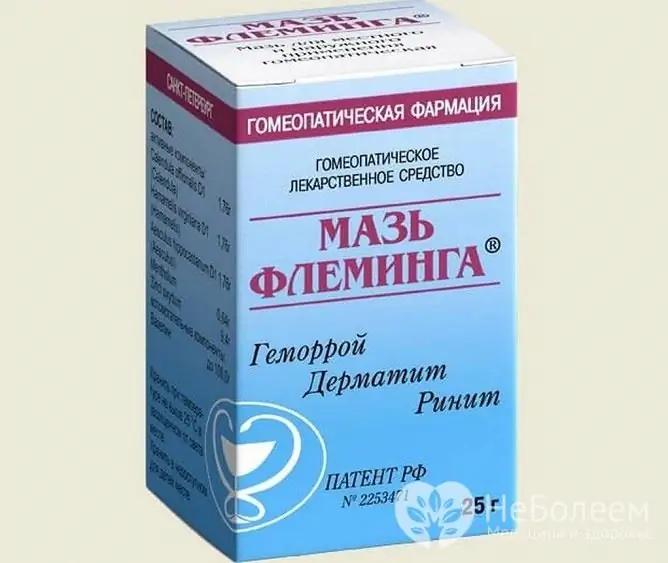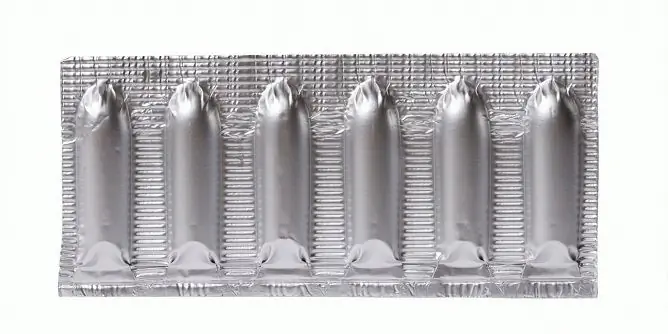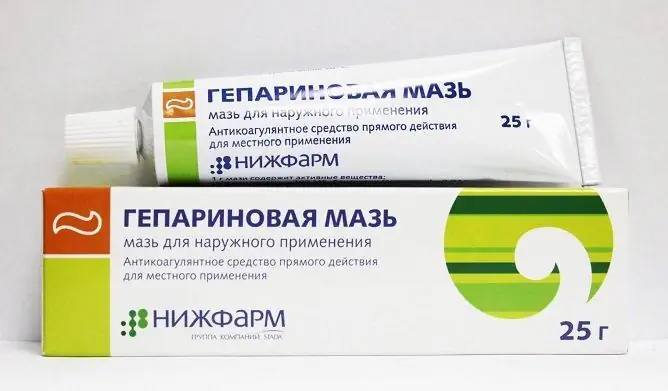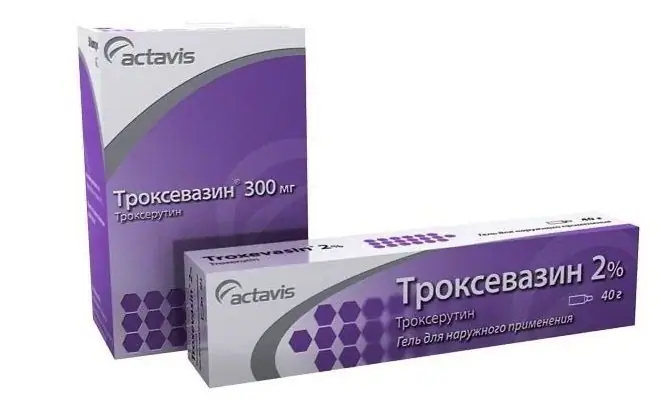- Author Rachel Wainwright wainwright@abchealthonline.com.
- Public 2023-12-15 07:39.
- Last modified 2025-11-02 20:14.
Ointments for hemorrhoids during pregnancy
The content of the article:
- How to choose an ointment for hemorrhoids during pregnancy
-
The most popular antihemorrhoid ointments and their use during pregnancy
- Heparin ointment
- Hepatrombin G
- Ointment Relief
- Ointment Relief Advance
- Fleming's ointment
- Homemade ointments
- Hemorrhoids during pregnancy: causes, forms and symptoms
Ointments for hemorrhoids during pregnancy are among the topical preparations. They do not have a systemic effect and have the least side effects, therefore they are safe for the forming and growing fetus.

The use of any anti-hemorrhoid ointments during pregnancy is possible only after consulting a doctor
The use of an ointment for hemorrhoids during pregnancy, according to doctors, is usually enough to cope with the most unpleasant symptoms (itching, burning in the anal region, painful bowel movements, bleeding). In addition to ointments, gels, creams, suppositories can be prescribed. For external hemorrhoids during pregnancy, ointments, gels and creams are the preferred forms of drugs, and for internal hemorrhoids, suppositories are more convenient.
Therapy will be more effective if drug treatment is supplemented by physical therapy, a balanced diet that ensures regular bowel movements, and daily walks in the fresh air. In many cases, this comprehensive approach ensures complete recovery from the disease.
How to choose an ointment for hemorrhoids during pregnancy
The pharmaceutical market offers a large number of effective and safe drugs that can be used in the treatment of hemorrhoids during pregnancy. Despite the over-the-counter dispensing in pharmacies, when choosing a drug, you should consult with your doctor about which one can be used in a particular case, since each ointment has its own indications and contraindications. Each of them has a certain effect, and if used incorrectly, it can be at best useless, at worst - lead to an increase in symptoms.
According to the type of action, antihemorrhoid drugs can be divided into several groups: anti-inflammatory, thrombolytic, hemostatic, emollient, stimulating tissue regeneration. This division is to some extent arbitrary, since most modern hemorrhoid ointments provide several therapeutic effects at once.

Heparin ointment helps to eliminate inflammation by improving blood circulation
In the acute phase of the disease, ointments are prescribed that have anti-inflammatory, antimicrobial, anesthetic, hemostatic effects, in the recovery phase - softening, promoting the speedy healing of tissues, stimulating blood circulation.
Ointments for hemorrhoids during pregnancy, which eliminate inflammation and prevent the development of an infectious process, are usually prescribed in case of an exacerbation of the disease, in the presence of a pronounced inflammatory process, as well as in case of prolapse of hemorrhoids from the rectum. Such topical preparations quickly relieve swelling, accelerate the recovery of damaged tissues, and prevent the development of an infectious process in the affected areas of the anal region.
For external hemorrhoids, accompanied by bleeding, it is recommended to use ointments that have a vasoconstrictor and venotonic effect. Such drugs help to strengthen the vascular wall, improve blood circulation, prevent bleeding from hemorrhoids, relieve swelling, and eliminate discomfort in the anal region.
The duration of treatment and dosage are selected by the attending physician in each case. Usually, the ointment is applied to external hemorrhoids 1-4 times a day for one to two weeks. Ointments can also be used for internal hemorrhoids. In this case, they are applied to the affected area using a special applicator, and if not, on a cotton swab, which is then inserted ½ into the anal canal.
The most popular antihemorrhoid ointments and their use during pregnancy
Heparin ointment
Heparin ointment, the main component of which is the anticoagulant heparin, quickly and effectively relieves inflammation, promotes resorption of blood clots and prevents the formation of new ones. The effect is enhanced by the presence of benzocaine and benzyl nicotinate in the preparation, which promote the penetration of heparin into tissues, and also provide an analgesic effect. Indications for the appointment of Heparin ointment are an increase in external hemorrhoids, the presence of a pronounced inflammatory process, a high risk of thrombosis of hemorrhoids.
Heparin ointment is contraindicated for anal fissures, erosion of the anus, increased bleeding, and there is a risk of spontaneous abortion. In the 1st trimester, the drug is not prescribed.
Since the ointment has a number of side effects and contraindications for use, it can be used by patients during pregnancy only after consultation with the attending physician.
Hepatrombin G
Ointment Hepatrombin G has a thrombolytic effect, relieves swelling and inflammation, has an analgesic effect, and helps to reduce dilated veins. Hepatrombin G is effective in all forms of hemorrhoids (internal, external, mixed), anal fissures, anal itching, eczematous lesions of the anal area.
Contraindications to use are individual intolerance to the components of the drug, increased bleeding, as well as the addition of a secondary infection.
The drug is approved for use from the 2nd trimester of pregnancy due to the presence of a hormonal substance in its composition.
Ointment Relief
The active ingredient in the Relief ointment is shark liver oil. It helps to stop bleeding, accelerates the healing of damaged tissues, eliminates the inflammatory process, and allows you to get rid of the itching sensation in the anal area. In addition, the ointment has a vasoconstrictor effect, relieves puffiness. It is effective if patients have anal fissures and an itching sensation in the anus.
The drug is prescribed for both external and internal hemorrhoids.
Contraindications to the use of Relief ointment are intolerance to the components of the drug, the presence of blood clots, granulocytopenia, and arterial hypertension. This ointment for hemorrhoids during pregnancy in the 3rd trimester is prescribed only for strict indications.
Ointment Relief Advance
Relief Advance ointment, in addition to shark liver oil, contains benzocaine, which has an analgesic effect. Thanks to this composition, the agent allows you to eliminate the inflammatory process, get rid of itching, burning, reduce soreness, and also reduce bleeding and promotes the speedy regeneration of damaged tissues.
Has a softening effect, which allows you to eliminate severe pain during and / or after bowel movements.
The use of Relief Advance ointment is indicated in the presence of erosions in the anus, ulcers of the rectal mucosa, anal itching; contraindicated in the presence of individual intolerance to the components of the drug and in thromboembolic conditions.
Fleming's ointment
Fleming's ointment is a homeopathic preparation that includes extracts of calendula, horse chestnut, witch hazel, as well as menthol and zinc compounds. The manufacturer claims that such a composition helps to eliminate the inflammatory process, prevents the development of infection, relieves pain and strengthens the walls of the blood vessels of the anal region.

Fleming's ointment has practically no contraindications and can be used at any stage of pregnancy
Fleming's ointment is prescribed for the external form of hemorrhoids with the release of blood, mucus and venous exudate from the anus (weeping hemorrhoids).
The drug has no contraindications other than intolerance to the components of the drug.
Homemade ointments
According to the reviews of doctors and patients in the early stages of hemorrhoids during pregnancy, homemade ointments can be effective. Their composition as an active substance may include propolis, extracts of calendula, oak bark, St. John's wort, bud herb, calamus, chamomile flowers and other medicinal plants. For the base, petroleum jelly, internal pork fat, high quality refined vegetable oil, glycerin are taken. Despite the safety of such funds, pregnant women can also use them only with the permission of a doctor.
Hemorrhoids during pregnancy: causes, forms and symptoms
Pregnancy and childbirth are among the main risk factors for the development of hemorrhoids in women. This is due to the fact that hormonal changes occur during pregnancy, affecting the vascular tone, and the growing fetus squeezes the vessels of the pelvic floor.
The risk of hemorrhoids increases by wearing tight underwear, a sedentary lifestyle, as well as excessive physical activity, exposure to stress, unhealthy diet, which leads to a tendency to constipation.
In the 1st trimester of pregnancy, the risk of developing hemorrhoids is primarily due to the action of progesterone, which is produced by the woman's body in large quantities and affects muscle and vascular tone.
In the 2nd trimester, against the background of dyspeptic symptoms, edema, toxicosis, physical activity usually decreases slightly, which, in combination with constipation, which is also common during this period, can lead to stagnant processes in the blood vessels of the pelvic region.
In the 3rd trimester, the fetus exerts significant pressure on the blood vessels, which can lead to impaired blood circulation in the perianal zone.
Increases the risk of developing hemorrhoids hereditary weakness of the vascular wall and venous insufficiency of the anorectal region.

Relief Advance ointment has an analgesic effect and accelerates the regeneration of damaged tissues
Hemorrhoids can be external, internal and mixed, have an acute and chronic form. The latter proceeds with alternating periods of exacerbation and remission.
During the course of the disease, four stages are distinguished:
- Hemorrhoids do not fall out of the anal canal, other symptoms of hemorrhoids appear from time to time, usually with a bowel movement or significant physical exertion.
- Hemorrhoids can sometimes fall out of the rectum, usually after a bowel movement, but set back on their own.
- Hemorrhoids fall out of the anal canal and do not come back on their own, but they can be adjusted manually.
- Hemorrhoids fall out of the rectum and do not come back, attempts to set the nodes with hands have no result, since they fall out of the anus again.
Signs of hemorrhoids usually appear from the 2nd trimester of pregnancy. Among the main symptoms are discomfort in the anal area (itching, burning, sensation of a foreign object in the anus), pain during and / or after defecation, bloody discharge from the anus, which can be seen on toilet paper or in stool.
Hemorrhoids in the initial stages usually do not have pronounced manifestations. However, it should be borne in mind that in most cases it does not go away on its own, without medical assistance, and continues to develop. In this case, it significantly impairs the quality of life, which is especially undesirable during pregnancy. It is important to consult a doctor at the first signs of the disease - in this case, conservative therapy with safe topical drugs may be sufficient to cure.
YouTube video related to the article:

Anna Aksenova Medical journalist About the author
Education: 2004-2007 "First Kiev Medical College" specialty "Laboratory Diagnostics".
Found a mistake in the text? Select it and press Ctrl + Enter.






